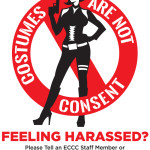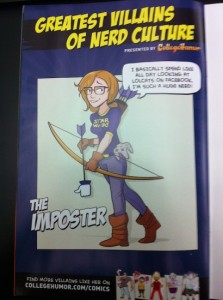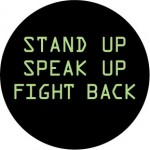
Misogyny is a word that has been thrown around a lot lately in the geek community. A lot has been written on the subject of misogyny in geek culture recently. It would almost seem redundant to write another piece on the subject. And yes I realize I am a guy writing about this, but here is why it is needed, because there cannot be enough voices speaking out about it. In fact with so much misogynistic speech going on in geek culture right now, to not speak out on it would be an act of moral cowardice.
I’m about to go into some specifics now so if you are reading this and the subject of various ways women can be attacked are triggers for you it would be best to be prepared.
So why are we seeing so much misogynism now. Well I don’t think it is a recent development. I don’t think a bunch of guys went “Oh man, the women are getting uppity; I better act like an entitled prick to put them in their place.” It’s always been there, but a couple of things have made it more visible .One is the internet. People can communicate online more easily and rapidly then they use to. Add to that the anonymous nature of online communication and you have people who feel they can get away with things they would never have dared in the past. That’s the bad news, the good news is that people are not shutting up and taking it as much now. These two combine to create the greater visibility.
Of course why it happens in the first place is no secret. From the start the collections of interests and hobbies that compose geek culture have been traditionally male dominated. And not just any males, these are usually the guys that were not part of the popular crowd in high school. Add a tendency for those with already poor social skills to be drawn to fandom and you have your stereotype of the geek.
And now you have to look at how women are traditionally portrayed in comics, science fiction and fantasy. You have the damsel in distress, who waits for the manly hero to save her, or you have the kick ass female who makes up for poor character development with skimpy over-sexualized attire.
Here is a great example; this is the cover for the upcoming issue #0 of Catwoman
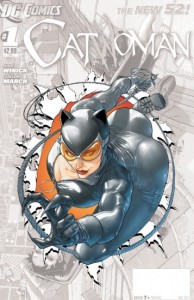
Notice how you can see her face, breasts, and butt all in the same shot. For that to be possible her spine would need to be made of rubber. In fact rubber spine is fairly common in female superheroes.
So your average woman looking at this is not going to feel welcome in most geek settings. This has led to women in fandom historically being treated as rare as a unicorn.
Of course these days you have women who are making their mark in fandom. And here is the seed of the misogyny. The guys have had it as their special corner and now the ladies are showing up and expecting to be treated as people. A lot of guys do not know how to deal with this and feel threatened, and when people feel threatened they often go on the attack.
In the end the misogyny is all about power. The guys employing it want to make the women do what they want and are using what they perceive as the best tools to do it.
No better example exists than Anita Sarkeesian and her Kickstarter campaign to fund her web video series “Tropes vs. Women” which looks at how females are portrayed in video games. Since this is certainly going to look at the sexist way a lot of games treat women (We’re looking at you Duke Nukem) a backlash arose against Sarkeesian and took on a very ugly misogynistic tone. Beyond sexually harassing messages on line people have made pictures of her being raped by video game characters and one person even went so far as to make an online game where you can beat her up.
Clearly the goal was to shut her down, but the good news is that it has had the opposite effect. Her Kickstarter goal was $6,000. At this point she has now made over $100,000 and is looking to expand the scope of the series. Rather than make her shut up, the attack has given her an even better chance to speak and brought supporters out in droves.
This is a part of the story that seems to keep coming up again and again. The use of misogyny to make women shut up is being met with defiance and a refusal to be backed down. It is by no means easy. I’m sure Anita Sarkeesian has had many low moments during this.
Other examples include the recent incident where a writer for the gaming website Destructoid, Ryan Perez, went on an extremely sexist rant against Felicia Day, and the very recent incident of comedian Daniel Tosh joking that it would be funny if a female who called him out on making a rape joke were gang raped right then and there.
Perez did apologize and is no longer with Destructoid. The back lash against Tosh was so strong that he had to issue an apology less than a day after the story broke. But in both cases it feels a lot like both apologies were more prompted by “we got caught” then “we are truly sorry”. Also a lot of people came out in support of Perez and Tosh saying they should not have been called out in the first place.
Moving away from the power struggle itself for a moment, one of the big laments of people in the comic book and gaming industries is the desire to bring in more female consumers. However while they say this they still put out the objectifying material to appeal to the male demographic.
It doesn’t help that in most of the geek industries that not only are the customer base primarily male, but so are the creators. Let’s face it most men are not sure how to write or present women.
Here is an example. Here is how the Black Widow poster for Iron Man 2 looked

Now here is the Black Widow poster for the Avengers.
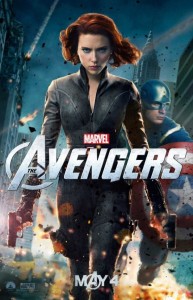
So it is the same actress, the same character and the same basic costume. But one looks like she is posing for a Maxim cover and the other looks like she is about to kick your ass. So what is the difference? It think it is that the Avengers is directed and written by Joss Whedon and he likes to present strong women that are actually empowered.
While we are on the subject of the Avengers I should note that a lot of reporters would tend to ask Scarlett Johansson questions that were the verbal equivalent of male gaze. One reporter asked if she wore underwear under her costume and she asked if he would ask her male co-stars the same question. The best thing to come out of that was the fact she would not put up with that crap.
As I said earlier, in the comic book industry a constant effort is put forth to bring in more female readers. However you just need to look at that image of Catwoman again to see the problem there. Another hurdle is the phenomenon known as women in refrigerators. For those not familiar with the term it comes from a story line where a new Green Lantern, Kyle Rayner, was chosen. Kyle had a girlfriend Alex DeWitt. 6 issues after she was introduced Alex is murdered and her body stuffed into a refrigerator for Kyle to find. This is what sparks him to take being a superhero seriously.
Writer Gail Simone cited this as a prime example of writers in comics using the murder or abuse of a female character to propel the story of a male character. She maintains a site called Women in Refrigerators listing the significant examples of this trope. It also has a listing of responses it has gotten. Want to take a guess at the tone many of them take?
Another view on this is more personal. My sister* and I use to both work at Wizards of the Coast. During that time we both would be sent to conventions to work the booth. It amazed me that amount of guys who thought she was just a “booth babe” and didn’t know what she was talking about. For the record she is just as much a gamer and con geek as I am and most definitely knows what she is talking about. In fact go check out her site and tell me if you think she knows nothing.
The point of this is that the geek culture has a bad habit of objectifying women. The end result is that you do not see them as people, and this can make it way too easy to treat them horribly.
So how do we fight this? The first thing is easy to say, but hard to do. Speak up about it. When you see someone make misogynistic comments you call them on it. Even if dozens of people jump on you, you need to speak up. The peer pressure can get really bad. People feel a sense of entitlement when they make these comments and no one wants it pointed out that they are on the wrong side of the issue. But this is not an issue with two valid sides, misogynism is wrong, period. If Anita Sarkeesian can handle the crap being hurdled at her, you can stand a few flame posts.
The next part is even harder. You need to take a long hard look at your own comments, especially you guys. The misogynistic attitudes are cultural and it can get so indoctrinated that you can fall into it without realizing it. I know I have caught myself more than once. We have to make sure that we are not part of the problem. The best advice I can give is take your brain with you. Think before you comment. Remember that the people you are dealing with online, at a convention, or at a comic book shop are in fact real people with feelings that can be hurt.
If you want to read another site that covers this really well I would like to point you to Geek Girls Rule. This is a site that covers geek culture from a female perspective. As you can imagine they have covered this subject more than once and have received more than their fair share of grief for it. But they know what they are talking about.
As for where we go from here, this site is still going to be about celebrating geek culture and I will be going back to the fun stuff soon enough, but I am also pretty sure the we will be covering this again at some point in the future.
In the end I would rather say that I am part of the solution rather than part of the problem.
And if you feel the need to flame me for saying this, bring it.
*(We aren’t actually blood relatives. I may get around to explaining the nature of that relationship someday. I call her father dad and he refers to me as son, so it’s good enough for us)
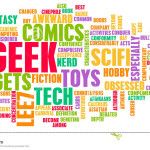 It’s March, and we are now weeks away from the beginning of Convention season.
It’s March, and we are now weeks away from the beginning of Convention season.
